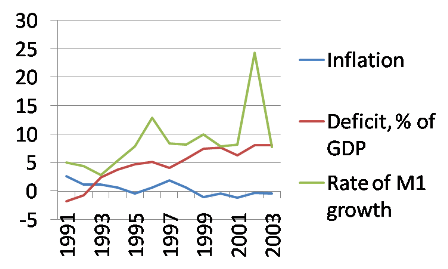Imagine this crisis as a plane bombing the global village (which here is represented by an actual village). It approached the US first (I guess their house overlooks the town from the side from which the bomber approached, but that isn't important), and they threw everything they could at the situation, starting with dramatic cuts in interest rates (from 4.75% in September 2007 to 0-0.25% in December 2008, where it has remained ever since). It is not zero precisely due to technical difficulties with maintaining rates at that value (what they set is a target rate). They have since bailed out the banks (TARP, TALF and various other programs) culminating (or perhaps not) with the
stress tests that most of the leading banks passed, according to reports today. They also had a massive stimulus bill in their budget, acting as a boost the economy. This, in my metaphor, amounts to firing every available anti-aircraft weaponry at the plane.
In Britain, we were slower to acknowledge the threat. In July 2007 rates were raised to 5.75% and only started dropping in December 2007, finally reaching 0.5% in March 2009. We lead the way on "
saving the world........'s banks" and also had a "stimulative" budget, running
a whopping 12% deficit for two years. This amounts to using all available anti-aircraft weaponry, except starting with lower stocks. Consider also that Gordon Brown did much of the shouting about the peril we were all in.
In Europe, they are still throwing stones. The ECB started cutting rates in October 2008 from 4.25% and are STILL cutting, and in a position to cut rates. Today they went
from 1.25% to 1%. Given that European economies are suffering every bit as much as British and American ones, it beggars belief that the ECB hasn't done more, sooner. Euro-zone governments have been less forthcoming in their stimulus packages too, although in Ireland's case it is because potential lenders
won't give them any money. They must be assuming that the Americans, Brits or possibly the Japanese, Chinese or others will shoot this plane down for them. Put simply, they aren't doing their bit to help defend us all from a decade of penury.

